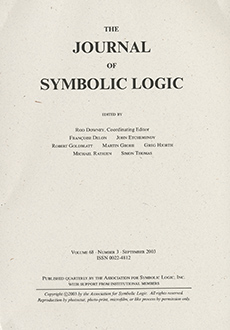Abstract
We investigate the question “To what extent can random reals be used as a tool to establish number theoretic facts?” Let 2-$RAN$ be the principle that for every real $X$ there is a real $R$ which is 2-random relative to $X$. In Section 2, we observe that the arguments of Csima and Mileti [3] can be implemented in the base theory $RAN_0$ and so $RAN_0 +$ 2-$RAN$ implies the Rainbow Ramsey Theorem. In Section 3, we show that the Rainbow Ramsey Theorem is not conservative over $RAN_0$ for arithmetic sentences. Thus, from the Csima—Mileti fact that the existence of random reals has infinitary-combinatorial consequences we can conclude that 2-$RAN$ has non-trivial arithmetic consequences. In Section 4, we show that 2-$RAN$ is conservative over $RCA_0 + B\Sigma_2$ for $\Pi^1_1$-sentences. Thus, the set of first-order consequences of 2-$RAN$ is strictly stronger than $P^-+I\Sigma_1$ and no stronger than $P^- + B\Sigma_2$.
Citation
Chris J. Conidis. Theodore A. Slaman. "Random reals, the rainbow Ramsey theorem, and arithmetic conservation." J. Symbolic Logic 78 (1) 195 - 206, March 2013. https://doi.org/10.2178/jsl.7801130
Information





